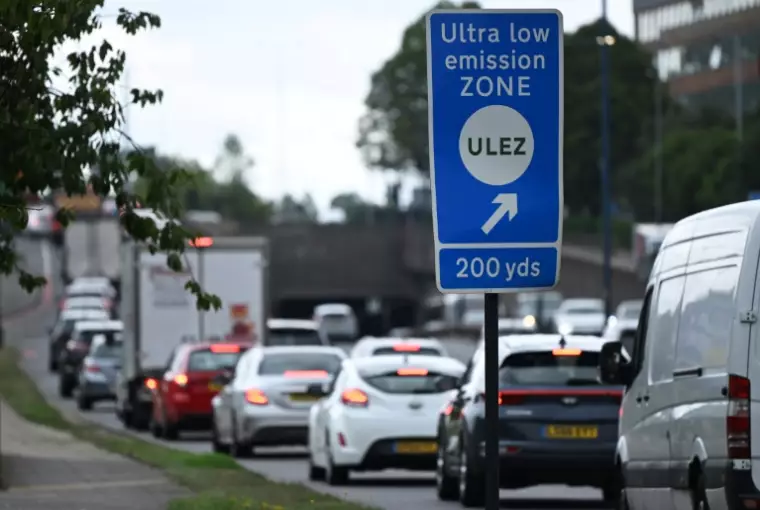The controversial extension of the tax on the most polluting vehicles in London came into force on Tuesday, despite the reluctance of some of the inhabitants in the midst of a crisis in the cost of living and the hostility of the government.
Restricted to central London when it was introduced, the ultra-low emission zone (ULEZ), which aims to ensure better air quality for residents, had already been considerably enlarged in 2021. It has now been extended to all of Greater London and its nine million inhabitants.
But the measure, launched in 2015 by the conservative Boris Johnson when he was mayor and now carried by his Labor successor Sadiq Khan, is criticized by many residents.
A few hundred people demonstrated outside Downing Street on Tuesday, waving signs hostile to the mayor. Among the slogans: “Liar Khan”, “Khan must go”, “The time has come for the dictator to go”.
“I can’t afford a new car. But I need my car twice a week for my job,” says Robin Dewey, a 64-year-old resident of Bromley (south London), employed part-time in a bakery.
For him, like most protesters, Sadiq Khan expanded ULEZ “because he needs the money”.
“They don’t know how to manage their budget so they make us pay,” adds John Davis, a 66-year-old retiree. “They use pollution to take money from the poorest”, but “pollution does not exist”, he says.
“Their Range Rovers, their big cars pollute more than mine, an 11-year-old diesel,” criticizes Francesca Silvani, a 58-year-old accountant.
“London’s air is clean. We don’t need” the ULEZ, assures Suzan Ward, a 68-year-old retiree.
Many of the demonstrators wore yellow vests, reminiscent of the social movement that shook France from the end of 2018.
– Electoral defeat –
Drivers of petrol cars generally manufactured before 2006 (Euro 4 standard) and diesel vehicles generally manufactured before 2015 (Euro 6 standard) must pay 12.50 pounds (14.80 euros) per day to enter the ULEZ, under penalty of a fine of 180 pounds.
For trucks and coaches, you have to pay 100 pounds (116 euros) per day. Taxis are exempt.
The Labor opposition, which largely dominates in the polls, has already suffered from this policy at the polls, losing a local vote in a constituency concerned by the extension of the tax, when it was given the favourite.
Labor leader Keir Starmer then asked Sadiq Khan to “reflect” on his decision to expand the ULEZ, saying it had “undoubtedly” cost Labor this election.
The conservative government of Rishi Sunak has rushed into the breach and denounces the measure.
In the pre-election period, before the legislative elections next year, environmental activists are now worried about a questioning of the United Kingdom’s climate policies, whose long-term objectives clash with the voters’ short-term priorities, in particular their purchasing power.
Despite criticism, legal action and sabotage – hundreds of ULEZ cameras vandalized in recent months, according to police – Sadiq Khan is maintaining his course.
He assures that the vast majority of vehicles in circulation are already compliant and estimates that his project will allow “five million additional Londoners” to breathe “cleaner air”.
ULEZ “has a proven track record in central London, but I believe clean air is a right, not a privilege. (…) Why couldn’t they breathe clean air” in Greater London?, the mayor said Tuesday morning.
According to a 2022 report, air pollution caused 1,700 hospitalizations in London between 2017 and 2019.
Faced with criticism, the town hall has set up an aid program to allow residents and businesses to change vehicles.
Greenpeace welcomed the extension of the ULEZ. The city of London “can be proud today”, reacted the organization for the defense of the environment.
This article is originally published on boursorama.com


